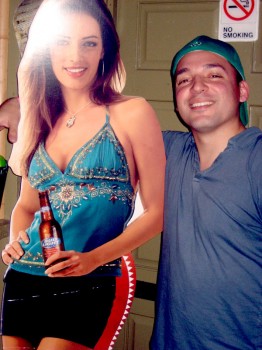Everything we do in life is motivated by our desire to feel pleasure. The businessman who works hard does it for the feeling he anticipates he will get from the respect, resources, and adoration afforded by a higher position and salary. The parents who undergo sacrifices raising their children do it because they want to experience a certain form of nurturing love. A friend who opens his heart to another does it to feel emotional relief and intimacy. The drug addict who pierces his vein with a needle does it for bliss. The ascetic meditating in a cave in the Himalayas does it for the same reason.
“The problem is that we do not understand what pleasure actually is. It has the power to both elevate and degrade us.”
We may believe that our actions are motivated by things such as morality, love, instincts, conditioning, or escapism – and they may be – but underneath is the overarching desire to feel some form of pleasure. I use the word ‘pleasure’ here in its broadest sense: physical, emotional, or beyond. Whatever we believe will give us a ‘taste’ of some happiness, breaking us out of the ennui of our daily existence, giving us a sense of transcendence.
Since pleasure, according to many thoughtful philosophers, is the natural state of the soul in the spiritual realm, it is quite natural for the living entity to want to experience more and more of it here, in the physical, material world. The problem we run into, however, is when we do not understand the difference between pleasure which elevates us and pleasure which degrades us.
Look around. Does it seem like we, as the human race on planet Earth, have gotten the idea of pleasure right? Many of us are kind of “burnt out” by everything at this point. There is the economy thing, the politics/ war thing, the dysfunctional family thing, your choice of addictions, the information overwhelm, the pornographic and violence-for-sport media displays, the boredom, the isolation, the “nobody gets me”.
And it is getting worse by the day.
Where is the pleasure we are so much after?
BRAVE NEW WORLD
In his 1932 novel, A Brave New World, Aldous Huxley presents a futuristic world in which everyone is addicted to a state-sanctioned drug called soma. This drug, along with various bio-engineering techniques performed on the populace and the encouragement of promiscuous sex, is taken regularly by the citizens in order to numb out from the varieties of pain experienced in this material world, and to produce a feeling of pleasure. The government’s motive for the dispensation of soma is not an altruistic one, but rather to keep people happily engaged in economic consumption, without being needlessly “distracted” with such things as introspection, existential doubt, and independent thought.
So pleasure in this novel is presented as the ultimate tool for manipulation of the masses, and since we are designed to hanker after it, perhaps the only truly effective one.
At this point of evolution of our modern society, perhaps some might find a drug like soma quite useful. Because the things which we thought would give us some pleasure such as career success, happy family life, material abundance, interesting art and literature, experiencing different cultures, et cetera, are slowly and not so slowly vanishing from our world.
One might have a desire to strive for these things, but in a way, due partially to globalization, industrialization, media, and the general “progress” and exploitation of everything, these pleasures no longer hold the same appeal, nor do they exist in the same way, nor can we really afford them.
We have tried and done everything for pleasure. For example, the counterculture movement of the 1960’s and 70’s declared that sex, drugs, and rock ‘n’ roll, which many would consider “pinnacles of pleasure,” were really the way to go as social norms. It was done for some time and perhaps somewhat enjoyed. But in the end it left us as a society, weary, unfulfilled, strung out, diseased, and dysfunction-ridden. The counterculture movement was later replaced by the exorbitant materialistic and career-driven pleasure flavor of the 1980’s. Wall Street would be the next thing.
And so all throughout the history of mankind, did we think that this thing or that would give us the pleasure we hanker after? This search was stacked on top of the ever-present need for eating, sleeping, mating, and having security – in its various forms. Such is our predicament. We are beings created for pleasure, there are pleasures all around, but trying to enjoy them hurts us. What to do?

"It is like a pretty woman with nothing else going for her. She is temporary, ephemeral, shallow; she disappoints us."
THE COME DOWN
Some of us may not necessarily see our comfortable ideas of pleasure as degrading or hurtful, because it is all we have been taught and all we have in some sense. Nor do we necessarily desire an alternative. For some of us, it is “still okay.”
“Yes, I will keep trying until I get it right.”
But for some of us, perhaps the more fortunate ones, it is not okay, and there is something that feels terribly wrong with the things we have tried to glean pleasure from. We can sense its inviting yet evanescent quality; it slips through our fingers as we try to grab it. We are trying to bottle a cloud.
Attempting to enjoy material pleasures degrades and cheats us because we endeavor in a wrong direction. We do not understand our predicament. We inadvertently perpetuate our stuck condition. We do not understand that continuing in this same cycle of attempt and failure keeps us from focusing on what this life is meant for – the realization and pursuit of our spiritual identity.
With just a bit of analysis, one can arrive at a conclusion that there must be more than our current physical/material identity which we can right now easily discern. For example, one can readily state his current nationality, occupation, and year of birth. The engineer from Iowa, born in 1980, can state such facts with certainty. But where was this same engineer in, say, 1976? And where will this engineer from Iowa be upon his physical death? That he cannot say. He must take an explanation that is beyond the grasp of his current senses, one that alludes to a spiritual identity.
A conception of life limited only to a physical identity, the one comprising our few paltry years here on Earth, leads us merely into disease, old age, and ultimately death. This is not an optimistic program nor is it a reasonable summum bonum; it must point to something greater.
A NATURAL HIGH
The Bhagavad Gita states: “Never was there a time when I did not exist, nor you…nor in the future shall any of us cease to exist” (2.12). Furthermore, “Yet there is another unmanifest nature, which is eternal and is transcendental to this manifested and unmanifested matter. It is supreme and is never annihilated…” (8.20)
Instead of taking the broader, spiritual view, the pursuance of material pleasures serves to perpetuate the limited, depressing concept. It feeds and nurtures the temporary identity, causing us to take future births within the physical/ material realm through our over-identification with it.
Our misguided pursuit of material pleasures cheats us because instead of giving us the feelings we expect, it gives us incompleteness and even pain. Operat¬ing on a set of assumptions not based on ultimate reality, the promise of such pleasures constantly frustrates us and keeps us busy looking in the wrong places. It is like a pretty woman with nothing else going for her. She is temporary, ephemeral, shallow; she disappoints us.
It does not take a mystical genius to prove any of the above statements. Have you ever tried to enjoy something which later proved extremely painful? Have you ever achieved something you worked hard for, only to realize it is emptiness and futility? Have you ever lost a loved one? Have you ever thought you might be an extra-terrestrial who has accidentally landed on a strange and absurd planet?
In Vedic literatures, we get a clear explanation of what this is all about. The material world in which we currently live is purposefully designed for this process. Like Alice, we fell down a rabbit hole into a place of curious objects which don’t make sense. We are here because at some point of our spiritual evolution we wanted to enjoy separately from our creator, who has very lovingly offered us this facility. We asked for it.
This world is meant for us to exhaust the search for pleasure in it, by trying everything. Then, at some point, after various lives and pursuits, we are meant to stop, scratch our heads, and say, “Wait a minute. This isn’t right.” If you are feeling like you might be at this point of your life now, consider yourself fortunate. Because now the real endeavor can begin, which is the work required to qualify ourselves for reinstatement in real pleasure.
When our current 70 or so years are up, we have the choice of continuing on in the material world with a new body, with the same backdrop of false pleasures which we cannot enjoy, or we can go to a different world, where the pleasure is real and ever-lasting. The bodies we get there do not encounter the awkward and embarrassing conundrums of birth, death, old age, and disease. The pleasure there is substantial and ever-increasing.
Ample descriptions of spiritual worlds exist in Vedic literatures. It is the place where we “fit” and is actually our real home. It is the place we left a long time ago, and to which now we want to return. It is a sigh of relief. Everything we are trying to enjoy here is there also – friends, family, amusements, everything. But there we actually get to enjoy these things and the bonds are eternal.
A NEW APPROACH
Since we are made for pleasure, engage in pleasure we must. However, we must find a different way, a way which promotes our goal of returning to our natural position, and which makes sense to us on a deep level. Bhakti yoga, the science of pleasure which is elevating for the soul, offers us this other way. This yoga is satisfying because it addresses our innate desire for pleasure and offers us a tangible way of feeling it. It feels real because it is based on ultimate reality, which is familiar to our soul. It makes us endeavor in the right direction, joyfully.
We do not have to stop or negate all the things which naturally feel good to us right now. There is no need to turn into raving nihilists or false renunciates. We can start right where we are, tweaking our approach a bit, and performing our actions in consciousness of the ultimate spiritual reality. Simple means for activating our dormant true pleasure potential are available through bhakti yoga. Try it, see for yourself. If you resonate with these words, there is something here for you. There is pleasure, real pleasure in this life as well as in the next.
Because the alternative does not really exist.



